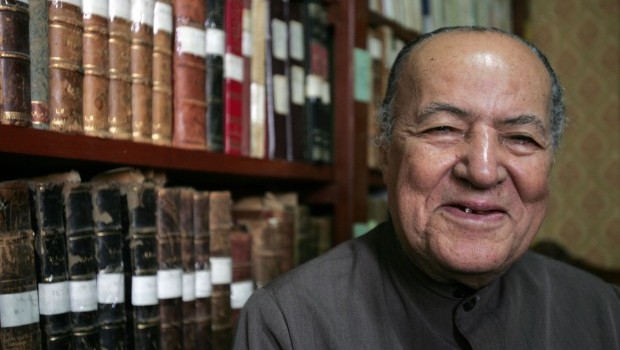Two days ago, Islamic jurisprudence and Egyptian Muslim Brotherhood expert Gamal al-Banna, brother of Muslim Brotherhood founder Hassan al-Banna, passed away.
He left our world at the age of 93. Early on in his life he distanced himself from his brother’s organization. He was never openly hostile towards the MB but nor did he disappear into their ranks like his nephew, Seif al-Islam Hassan al-Banna.
Sheik Gamal distinguished himself as a capable scholar of Islamic jurisprudence and made significant contributions to political and social fields including the relationship between religion and the state, the empowerment of women, and interacting with non-Muslims. All of his contributions were far removed from the hard-line MB rhetoric that claims to speak for all of Islam.
This fact did not endear Sheik Gamal to the MB in Egypt and elsewhere. They approached the brother of their imam and founder with caution and forbearance; however they never openly disparaged him or attacked his works. He was never outwardly hostile towards them and always spoke of his brother’s personality and message with esteem and reverence. However this was not enough to prevent some harsh commentary from ‘unofficial’ MB members regarding Gamal al-Banna’s judgments on legal and theological issues and his critiques of MB practises.
All of Gamal al-Banna’s works in the fields of jurisprudence and exegesis are held in high regard, however these undertakings were not his most prominent and definitive accomplishment. Others before, after, and contemporaneous to Gamal al-Banna have made more noteworthy contributions to the aforementioned fields. In my assessment, Gamal al-Banna’s greatest contributions are his documentations of the history of the MB as it navigated the societal and political vagaries which characterised Egypt over the past 80 years. He captured and detailed how a young boy watched his brother, Hassan al-Banna, establish the foundation of the MB, an organisation which has left a significant mark on both the Muslim mind and Muslim society.
Gamal al-Banna’s last works included several chapters from his book entitled The Unknown Documents of the Muslim Brotherhood. I believe that this type of writing and composition must be emulated and embraced by all who endeavor to preserve for posterity the formative moments of our contemporary political culture.
We in the Arab world live in a place where literacy is a privilege. Coupled with extreme poverty, it becomes a simple task to deceive the public and the media, and restructure the memory of times past to suit the interests of the rulers of the present. Meanwhile writers refrain from documenting and publishing, some out of caution and others out of disgust and despair over the current situation, unconvinced of the valance of writing to a society that does not read and does not intend to read.
Gamal al-Banna aside, many writers must document and write before they too pass on, not only regarding this provocative and enigmatic organization, but so as to preserve the posturing, promises, and events history produces.
Do we suffer from selective amnesia? Or are we just incapable of reading our past?
